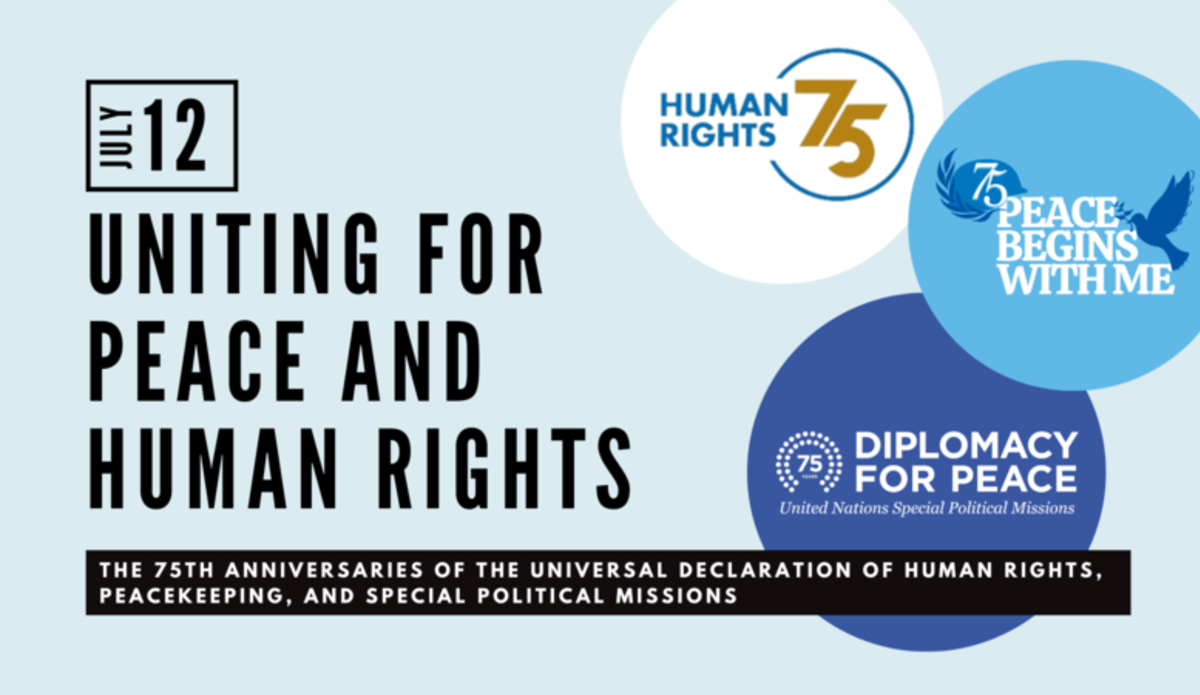The event is a joint event of the Office of the High Commissioner for Human Rights (OHCHR), the Department of Political and Peacebuilding Affairs (DPPA) and the Department of Peace Operations (DPO).
Date: 12 July 2023, 1:15pm – 2:30 pm (ET)
Venue: UN Headquarters, Conference Room 1
WebTV link: https://media.un.org/en/asset/k1l/k1ll6uyj41
Background:
2023 marks three concurrent 75th anniversaries for the United Nations: in 1948, the Universal Declaration of Human Rights was adopted by the General Assembly, the General Assembly mandated the deployment of the first special political mission, the United Nations Mediator in Palestine, and the Security Council established the first peacekeeping mission by deploying military observers to the Middle East. All three anniversaries mark the beginning of the UN’s efforts to materialize the vision of peaceful coexistence and social progress set out in the Charter:
- “to practice tolerance and live together in peace with one another as good neighbours”,
- “to unite our strength to maintain international peace and security”,
- “to employ international machinery for the promotion of the economic and social advancement of all peoples”.
The Universal Declaration of Human Rights (UNHR) makes a significant contribution to peace by establishing a framework that promotes and protects the fundamental rights and dignity of every individual grounded in key principles of equality, justice, and non-discrimination, which are essential to address the key drivers of the conflict. In that sense, it helps prevent conflicts, protect individuals, empower marginalized groups, and establish international norms and standards. UDHR's contribution to peace lies in its recognition of the inherent dignity and rights of every individual.
Peacekeeping is critical in maintaining peace and stability in regions affected by conflicts. It involves the deployment of multinational forces to help monitor, observe, and facilitate the implementation of peace agreements. peacekeeping contributes to peace by preventing and managing conflicts, protecting civilians, supporting peace processes, building local capacities, promoting the rule of law and human rights, and fostering regional and international cooperation. Through their presence and actions, peacekeeping missions help create the conditions necessary for sustainable peace, stability, and development in conflict-affected regions.
Special political missions are civilian missions authorized by the General Assembly or the Security Council under the Chapter VI of the Charter to assist Member States and support them in preventing and resolving conflicts and promoting sustainable peace. They constitute one of the most important mechanisms for operationalizing the work of the United Nations in peace and security. Operating in complex operational environments, including many that are characterized by volatile security situations and fragile political contexts, special political missions are essential mechanisms for implementing a range of mandates that contribute to the maintenance of international peace and security, including engaging in preventive diplomacy, supporting the implementation of peace agreements, protecting and promoting human rights, enhancing the meaningful participation of women, as well as advancing the engagement of youth in political and peace processes, and strengthening partnerships with regional and sub-regional organizations.
These are essential tools the United Nations has at its disposal to play a greater prevention role. The collective celebration of the 75th anniversary reaffirms that each of us has a role to play in building and maintaining peace. Celebrating the 75th anniversaries of UDHR, special political missions and peacekeeping together is an opportunity to recognize their interdependence, honor their historic significance, amplify their impact, and inspire collective action towards a future where human rights are upheld, conflicts are resolved, and global peace is achieved.
These anniversaries provide an opportune moment to reflect on the achievements, challenges, and lessons learned over the past seven and a half decades. By commemorating them together, we can deepen our understanding of the interconnectedness between human rights, peacekeeping, and peacemaking, and chart a path forward for a more sustainable and inclusive future.
Objectives:
- Reflect on the achievements and progress made in the implementation of the UDHR, the work of special political missions and peacekeeping initiatives, highlighting success stories and lessons learned.
- Showcase best practices, innovative approaches, and lessons learned from special political missions and peacekeeping experiences, promoting knowledge sharing and exchange among participants.
- Identify key recommendations and actionable steps to further advance the goals of the UDHR, peacekeeping and special political missions in the coming years, promoting sustainable peace and respect for human rights globally.
Programme:
Moderator: Ms. Karin Landgren, Executive Director, Security Council Report
13.15 – 13.30 Opening remarks
- Ms. Ilze Brands Kehris, Assistant Secretary-General for Human Rights
- Mr. Mohamed Khaled Khiari, Assistant Secretary-General for the Middle East, Asia and the Pacific, Departments of Political and Peacebuilding Affairs and Peace Operations
- Ms. Martha Ama Akyaa Pobee, Assistant Secretary-General for Africa, Departments of Political and Peacebuilding Affairs and Peace Operations
13.30 – 14.25 Panel incl. Q&A
Panelists:
- Ms. Georgette Gagnon, Assistant Secretary-General, Resident and Humanitarian Coordinator, UN Support Mission in Libya (UNSMIL)
- Ms. Anita Kiki Gbeho, Deputy Special Representative of the Secretary-General, UN Assistance Mission in Somalia (UNSOM)
- Mr. Guang Cong, Deputy Special Representative (Political) for South Sudan and Deputy Head of the UN Mission in South Sudan (UNMISS)
14.25 – 14.30 Closing remarks
- Ms. Ilze Brands Kehris, Assistant Secretary General for Human Rights

